Dear Colleagues,
Happy New Year!
With teams busy supporting the humanitarian response in Gaza, we would like to share some insight into how humanitarian coordination enables humanitarian assistance in the most challenging circumstances. You will also find an inspiring interview with the WASH Manager in Pakistan reflecting on the sense of possibility he found in coordination. And as usual, you will find resources and announcements that we hope will interest you.
Enjoy the reading!
The GCCS Team
Ongoing Support to the Humanitarian Community in the State of Palestine
With the most recent crisis in Gaza resulting in unprecedented humanitarian need and a highly constrained operating environment, UNICEF (co)-led Global Clusters and Area of Responsibility (AoR) provided rapid surge to ensure continuity of fully functional coordination mechanisms for the State of Palestine (SoP) in general and Gaza strip in particular. In addition to filling Gaza-level staffing gaps, they provided much needed support to overstretched national and sub-national clusters teams that, despite being also affected themselves, continue to work in extremely precarious and dangerous conditions.
Scaled up coordination has anchored the humanitarian response in Gaza. In the last months, the work of the clusters has particularly focused on data gathering and analysis, mobilizing partners to contribute to the response as well as partners capacity strengthening, strategic planning and advocacy to ensure the delivery of humanitarian assistance for the people in need in Gaza.
UNICEF (co-) led clusters and Area of Responsibility surge helped the field in its shift towards a higher intensity coordination. Deployees helped map partners’ capacity and brought cluster partners together to agree on operational standards and response plans for child protection, education, nutrition and WASH, as well as supporting multisectoral efforts. Clusters have played a critical role in strengthening the collaboration between UNRWA, UN agencies, local and international partners to cover the needs inside and outside UNRWA shelters.
Essential data gathered and dashboards developed by clusters on the level of needs, vulnerabilities, and response capacity have informed emergency programming planning processes, but also collective and individual clusters fundraising and advocacy efforts, particularly around humanitarian access, access of supplies, sectoral needs and prioritization of child protection, nutrition, education and WASH package of interventions in the overall response. For example, strong advocacy work by the Global Nutrition Cluster and UNICEF Country and Regional teams led to the activation of the Nutrition Cluster as a standalone cluster. From being previously set up as a sub-group under the Health Cluster, the Nutrition Cluster is currently able to better respond to the acute nutritional needs of the population in Gaza and provide essential lifesaving nutrition services. The Child Protection AoR deployee to the response set up a functional child identification system for separated or unaccompanied children, with the first cases of unaccompanied children being identified for documentation and family tracing. In the absence of formal education, the Education Cluster has been able to support coordination of partners implementing mental health and psychosocial support (MHPSS) and recreational activities in the three southern governorates in Gaza. The Global WASH Cluster has led intense advocacy efforts calling for safe and sustained access to water in Gaza for the survival of its 2.3 million inhabitants.
Support from the Global Clusters will continue in the upcoming months in areas such as resource mobilization, evidence generation, strategic planning for different scenarios, partner capacity strengthening to support service provision and collective advocacy efforts.
For more information on sectoral responses please click on the relevant logos
below:
Child Protection Area of Responsibility: SoP CP AoR website
Global Education Cluster: SoP Education Cluster website
Global Nutrition Cluster: SoP Nutrition Cluster website
Global WASH Cluster: SoP WASH Cluster website
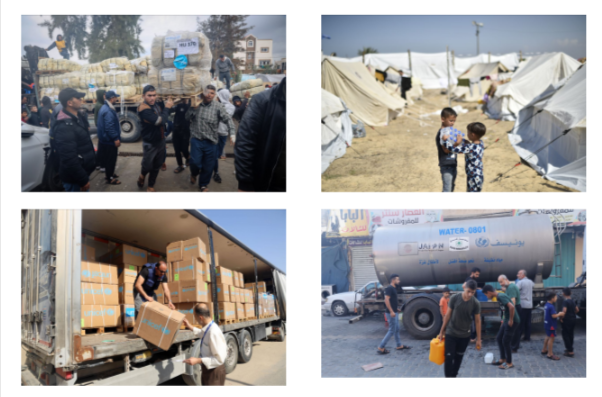
Updated! Guide on Cluster Lead Agency Accountabilities and Humanitarian Coordination
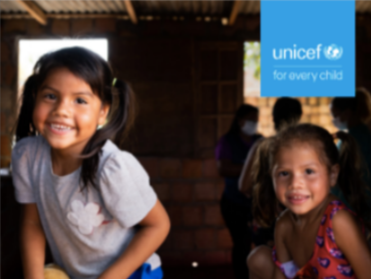
Humanitarian Coordination is UNICEF’s first commitment for children in humanitarian action. This Guide on Cluster Lead Agency Accountabilities and Humanitarian Coordination has been updated from its 2015 version to better equip UNICEF Country Offices (co-) leading the education, nutrition, and WASH clusters and child protection area of responsibility.
The guide was updated to incorporate new policies and evaluation recommendations, including the UNICEF Core Commitments for Children, Humanitarian Review, second Evaluation of UNICEF role as Cluster Lead Agency (CLARE II) and UNICEF Emergency Procedures among others. It is a reference document, not intended to be read from cover to cover. To facilitate consultation, the information in the guide is structured in two ways: Part One is organized by topic and Part Two by role. A companion intranet site is also available and similarly structured by topic and by role. The guide and website will be translated into French and Spanish later this year. Stay tuned for our dissemination webinars and clinics, and an upcoming FAQ!
Read the short version
Read the long version
Practical Guide to Advancing Policy Commitments and Cross-Cutting Concerns for UNICEF-led / co-led Clusters/Ao
You have all heard of the importance of integrating the centrality of protection, AAP, humanitarian development nexus, localization, disability inclusion and prevention of gender-based violence into the design of humanitarian programming. But what does this mean in practice for humanitarian coordination? And how can clusters play their key role in enabling this across an entire sector? the Second Evaluation of the UNICEF role as Cluster Lead Agency (CLARE II) called for UNICEF to provide clear direction to the clusters and AoR it (co-) leads on how to implement and prioritize policy and other institutional commitments on these topics to ensure UNICEF-led clusters/AoR are fit for purpose to respond to evolving trends and fundamental shifts in the humanitarian landscape.
The Practical Guide to Advancing Policy Commitments and Cross-Cutting Concerns bring synergies to the different policy commitments and cross-cutting issues, recognizing the importance of them all in advancing safe, accountable, inclusive and impactful programming. Rather than having siloed, and sometimes competing guidance for each specific issue, it brings them together holistically as a useful resource for cluster coordination teams across the four UNICEF led / co-led clusters and Area of Responsibility.
This guide highlights the ways in which clusters can work differently to integrate cross-cutting issues, not necessarily to do more work. It has been developed following extensive consultation and it is now at the final steps of validation with UNICEF-led/co-led clusters/AoR and UNICEF Programme. We are hoping to be able to share it widely in the coming months.
Global Clusters highlighted the role of coordination for sustainable development and peace at AidEx
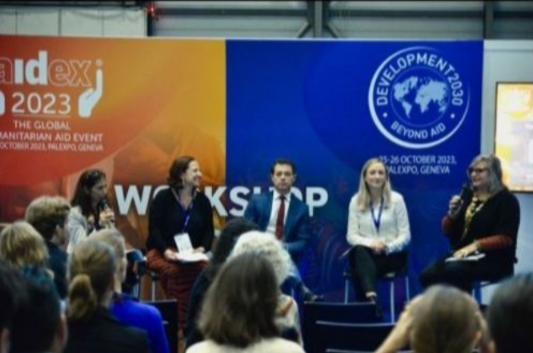
UNICEF-led clusters highlighted the role of effective and accountable coordination in humanitarian action and the importance of ‘joined up’ action for #CollectiveOutcomes at AidEx, the world’s leading humanitarian aid and disaster relief event held in Geneva on October 25th-26th, 2023. This event was attended by humanitarian actors, including international organisations and NGOs, government and private sector representations.
UNICEF-led clusters and area of responsibility organised several side events and were represented in two exhibition corners, one led by EMOPS, and one by the Global Cluster Coordination Group. Global Clusters highlighted their role and initiatives at global and country levels towards more coherent humanitarian-development coordination and response as well as showcasing inter-cluster collaboration in the field, with a focus on forgotten crises. UNICEF positioned cluster coordination to leave no one behind and its leading role as Cluster Lead Agency. The event was also an opportunity to connect and strengthen collaboration with global clusters, key partners and other humanitarian and development actors as well as explore and share new opportunities to increase the impact of coordination on humanitarian response.
Global Clusters discuss #CollectiveOutcomes to address fragility and climate at COP28
The COP28 Climate Summit aimed to accelerate climate progress on an unprecedented scale. Nearly 200 countries gathered in Dubai from 30 November to 12 December to determine ambition and responsibilities, and to identify and assess the already existing effects of climate change.
The UNICEF-led clusters and area of responsibility delivered a side event titled Fragility and Climate: Joined-up Action for Collective Outcomes at the Humanitarian Hub —the first ever at COP. The panel explored how joint action and #CollectiveOutcomes can more efficiently respond to those most affected by and vulnerable to crises in fragile and climate-affected contexts.
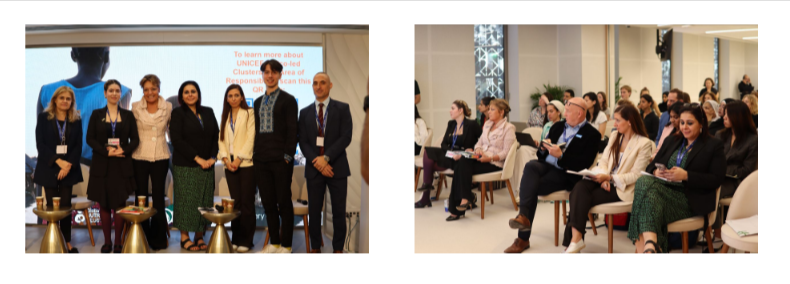
The interactive session was moderated by Mr. Jose Gesti, Senior WASH Adviser at Sanitation and Water for All, who introduced a diverse group of global partners and youth representatives sharing insight on effective climate-sensitive humanitarian intervention.
The opening remarks were provided by Mr. Andrew Harper, Special Advisor on Climate Action at UNHCR, who underscored how climate change is amplifying the frequency and intensity of sudden-onset disasters. He stressed how UNHCR works diligently to address risks and vulnerabilities related to fragility, climate, and displacement.
Ms. Rania Sharshr, the IOM Director at DPDC, outlined the key role coordination plays in achieving collective outcomes and maximizing efficient use of resources.
Dr. Petra Khoury, IFRC Director at Health and Care, shared insight on how climate change is impacting health in terms of morbidity and mortality due to increasing and frequent extreme weather events, which disrupt food systems, increase zoonoses and food-, water- and vector-borne diseases, and aggravate mental health issues.
Yasmine Sherif, Executive Director at Education Cannot Wait, stated that the climate crisis is an education crisis. Those disproportionately affected are the most marginalized, including children and youth affected by conflict and disasters, especially girls, minority groups, refugees and displaced children, and children with disabilities.
Finally, UNICEF’s Youth Advocates Ania and Vlad brought the unique perspective of young people who are advocating for the inclusion of youth in climate-related dialogue and decision-making.
All high-level speakers outlined key initiatives and innovative approaches that achieve more coherent humanitarian assistance, development cooperation and peacebuilding to reduce needs, risks and vulnerabilities for those in fragile and climate-affected contexts.
Learn more about the panelists at COP28 below.
Read about the Panelist Decision
#CollectiveOutcomes
The escalation of humanitarian crises has increased by 17 per cent since 2022, reaching an all-time high of 339 million people in need of humanitarian assistance and protection globally. Vital assistance is required for those living in fragile and climate impacted contexts to reduce needs and achieve sustainable development and peace.
"Joined-up" action for collective outcomes by humanitarian, development and peace actors is the most effective framework to "leave no one behind" as the central, transformative promise of the SDGs. In 2024, UNICEF-led Clusters and Area of Responsibility will continue promoting the importance and their commitment to #CollectiveOutcomes.
Learn more in our latest video!
Cluster Coordination, a Field Perspective with Itsuro Takahashi, WASH Manager in Pakistan
As part of our series on coordination, EMOPS’ Global Cluster Coordination Section and DHR bring the voices of colleagues in coordination roles to reflect on how we can collectively support and leverage UNICEF’s cluster leadership role.
For this interview, we had the privilege to speak with Itsuro Takahashi, who has served as WASH Cluster Coordinator in Ethiopia and Yemen prior to his current role as WASH Manager in Pakistan.
In this frank reflection, Itsuro talks about his interest in coordination and the immense potential he sees in the coordination roles for career development and gaining new skills, which are also relevant in programme roles.
Read the interview
Watch full video
Learn new skills with the Humanitarian Learning Channel!
In 2023, 2,736 learners in 288 cities used the Humanitarian Coordination Learning Channel in UNICEF's learning management platform -Agora- to learn new competences on Information Management. 5,440 modules were completed on Information Management alone in 2023.
With numerous courses on humanitarian learning, soft skills for clusters, cluster coordination and information management, the Humanitarian Learning Channel offers something for everyone, no matter at what stage of your career you are at this moment. The courses are available in English, French and Spanish.
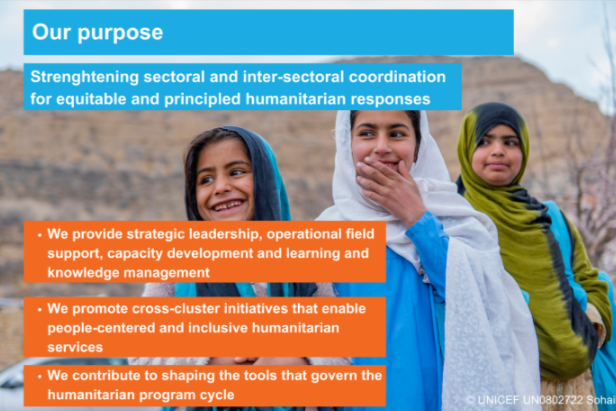
For additional information on the work of each cluster/area of responsibility please click on the images below.
We would welcome your feedback on our newsletter!
Please share your thoughts with us.
If you encounter any issues while opening links, please contact us
Copyright © Global Cluster Coordination Section, All rights reserved.